
Agentic AI is ready to transform how work gets done – but most teams aren’t equipped to build AI Agents or deploy them. To move from hype to real impact, enterprises need AI-powered skilling built for project readiness.
AI Is Everywhere – But Impact Isn’t
In boardrooms, strategy decks, and LinkedIn posts alike, AI is the business buzzword of the decade. According to McKinsey’s 2024 AI adoption survey, over 80% of enterprises have integrated GenAI tools into at least one business function. Whether it’s content creation, customer support automation, or operational analytics, companies are eager to leverage AI’s potential. Yet, here’s the contradiction: Few discuss the fact that less than 15% of these organizations report measurable, enterprise-level ROI from their AI investments.
This isn’t just a minor hiccup in tech adoption for Custom AI Assistants. It’s a fundamental operational and strategic challenge. Despite increased budgets, AI courses, and vendor partnerships, most companies remain stuck in pilot mode not knowing how to build AI Agents, unable to translate AI experiments into scalable, revenue-generating solutions.
GenAI Adoption, ROI, and Market Impact (McKinsey Data Summary)
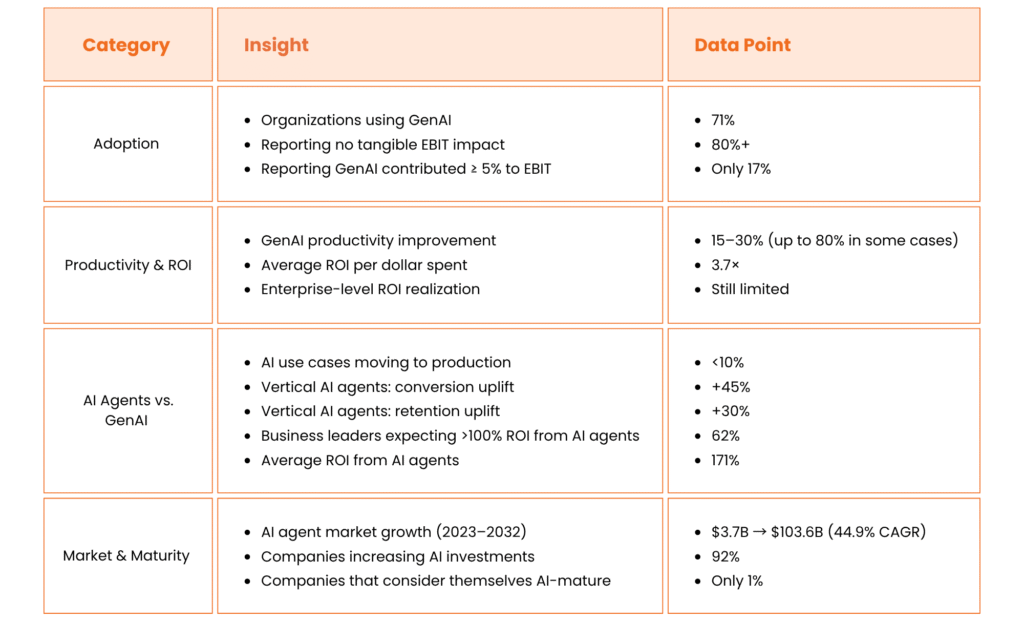
Why the GenAI paradox? What’s Stopping GenAI from Scaling in the Enterprise?
- Most enterprise teams are actively experimenting with AI. Yet few have managed to convert those experiments into operational agents capable of automating or transforming critical workflows. The reason is simple: while generic AI applications, like chatbots or document summarizers, can improve general productivity, they rarely deliver the kind of strategic, measurable impact organizations are seeking
- The real opportunity lies in building custom AI agents tailored to specific workflows, decision points, and business processes. These agents don’t just augment isolated tasks; they fundamentally reshape how work gets done, enabling faster decision-making, reducing process friction, and improving outcomes at scale.
- Until organizations bridge the gap between experimentation and workflow-specific automation, AI adoption will remain incremental rather than transformational.
Why Aren’t More Teams Building AI Agents?
While AI experimentation is widespread, few organizations have leaped to building and deploying AI agents at scale. This disconnect isn’t due to a lack of interest; it’s rooted in three persistent, structural barriers:
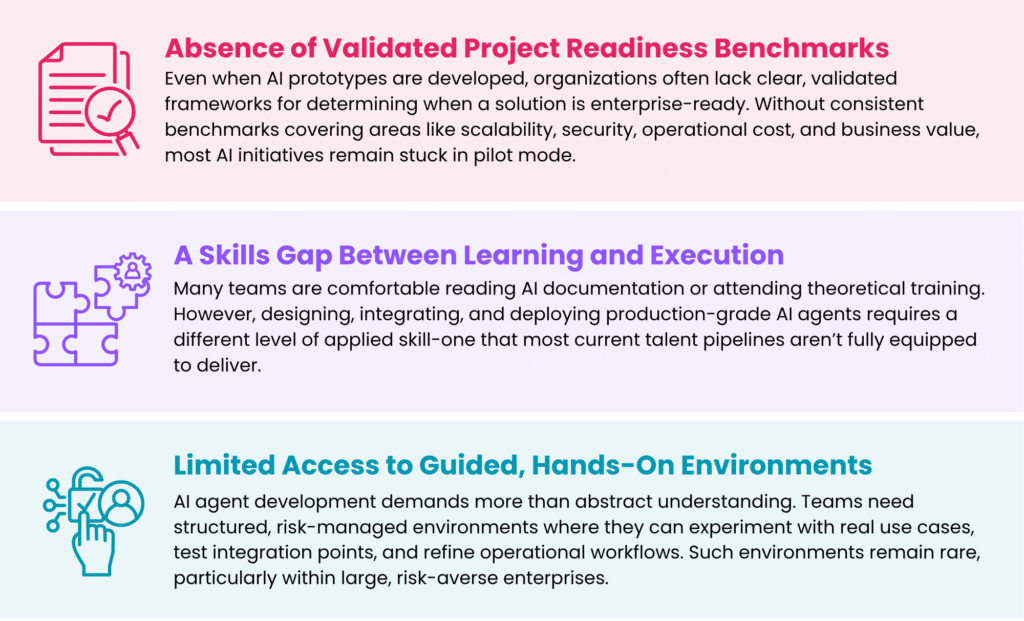
How Nuvepro’s AI Project Readiness Platform Moves Enterprises Beyond Experimentation and more ROI?
While generative AI and agentic AI tools continue to capture attention, most enterprises are still struggling to move from isolated pilot projects to scalable, production-ready AI agents that transform business workflows. The barriers are clear: a persistent skills gap, and no ROI in returns. Nuvepro’s AI Project Readiness Platform is built to address these exact challenges, helping organizations operationalize AI initiatives faster, with greater confidence and measurable business outcomes.
What Nuvepro Delivers
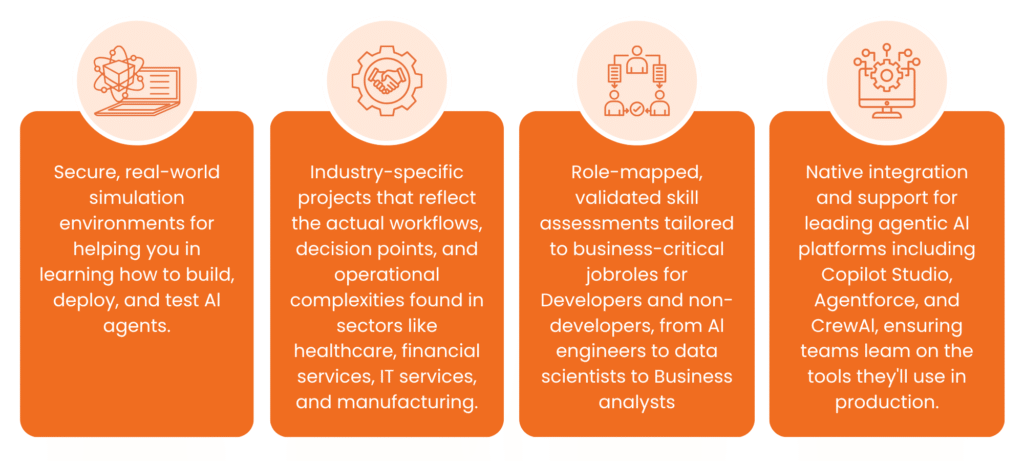
Project Outcomes That Matter
Nuvepro’s AI Project Readiness Platform is designed to deliver outcomes that go beyond learning metrics, directly impacting operational efficiency, project velocity, and the execution of enterprise AI strategy.
Measurable Business Impact:
40% Faster AI Project Launch
Skill-mapped, deployment-ready teams reduce project backlogs and accelerate time-to-market for AI-driven initiatives with the help of learning how to build Custom AI Assistants.
Up to 40% Lower Operational Costs
Workflow-specific AI agents automate high-volume tasks, reduce manual effort, and minimize SME dependency – unlocking operational savings at scale.
4-6 Weeks to Revenue Readiness
Trained talent transitions from bench to billable roles within weeks, enabling faster client project onboarding and internal capability deployment.
Margin Growth through Workforce Efficiency
Achieve over 85% skill visibility, improving workforce planning and project staffing decisions.
Cut SME evaluation time by 60% through automated, validated skill assessments aligned to enterprise KPIs.
More Pilots, More Wins
Confidently scale innovation programs and client-facing AI projects with validated, deployable teams, reducing project risk and increasing delivery success rates.
The Core Pillars of Nuvepro’s AI Readiness Platform
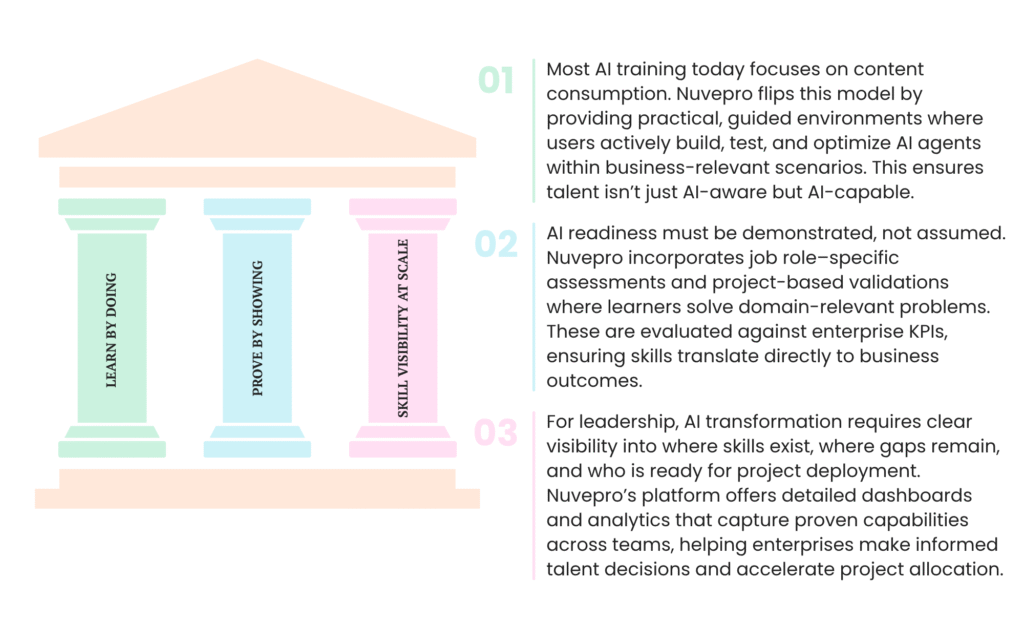
Why This Matters?
AI agents won’t drive enterprise transformation through theoretical awareness alone.
They require operational fluency, practical experience, and validated readiness to execute complex business workflows. Nuvepro enables organizations to scale their AI initiatives by closing the execution gap, building not just AI-literate teams but AI-proficient workforces capable of delivering measurable, business-aligned outcomes.
Built for the AI-Driven Enterprise
Nuvepro’s platform is architected for enterprise-scale AI adoption, addressing the full operational lifecycle from workforce readiness to production deployment, with enterprise-grade governance and system interoperability.
- Agentic AI Labs
Secure, scalable environments supporting Copilot frameworks, LLM fine-tuning, prompt engineering, AI agent orchestration, and structured data preparation.
- Real-World Practice Projects
Vertical-specific challenges in healthcare, financial services, IT services, and other industries – designed to replicate the operational complexities AI teams will face in production.
- Enterprise Integration
Seamless integration with enterprise infrastructure and platforms, including LMS, HRIS, Workday, Azure, Salesforce, and Google Cloud – ensuring AI upskilling aligns with existing systems and reporting frameworks.
- Built-in Governance and Compliance
Compliance-ready environments with integrated data privacy controls, audit trails, and policy frameworks aligned to enterprise security and regulatory standards.
Ready to Unlock Real AI ROI?
Most enterprises today aren’t held back by a shortage of AI tools-they’re held back by a shortage of project-ready, validated talent capable of operationalizing those tools in business-critical workflows.
Training alone isn’t enough.
“To realize the full value of your AI investments, you need teams that can move from concept to deployment, delivering measurable outcomes against real business challenges”.
Here’s how Nuvepro helps close that gap:
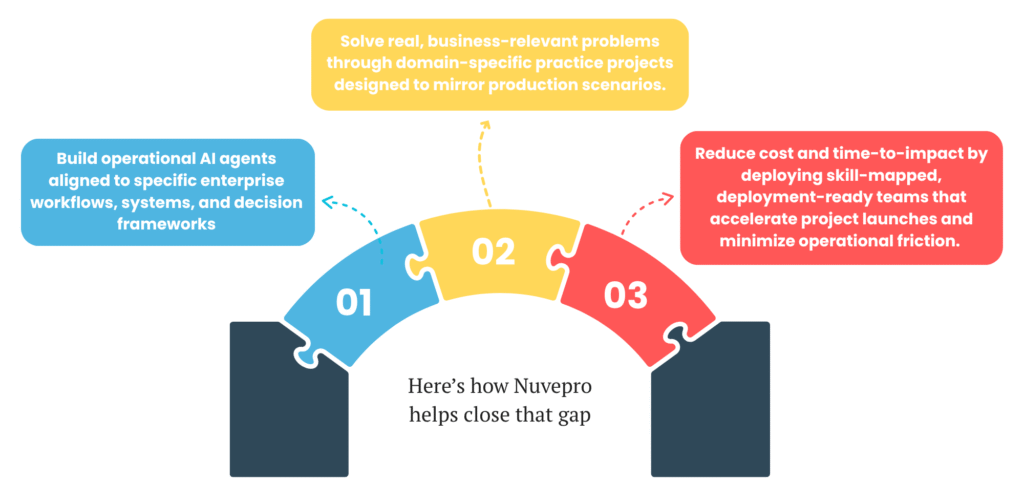
It’s time to move from awareness to operational capability. From pilots to scalable AI outcomes.
Your AI strategy demands a workforce equipped to build, deliver, and sustain AI initiatives, not just complete another course.
Conclusion: AI-Powered Skilling for Project Readiness: From Hype to Real Business Impact – The Next Non-Negotiable Shift
The AI conversation in enterprises has reached a pivotal moment. The numbers are clear, the case studies are real, and the market trajectory is undeniable. AI isn’t a question of “if” anymore – it’s a matter of “how well” and “how fast” organizations can operationalize it.
And this is where most enterprises are falling short.
Despite impressive adoption rates and a growing collection of GenAI tools, the business outcomes haven’t caught up. Productivity improvements and isolated pilot successes are no substitute for enterprise-level ROI, operational efficiency gains, and workflow transformation. The real value of AI – especially in its agentic form – lies in its ability to reshape decision-making, automate mission-critical processes, and enhance customer outcomes at scale.
But achieving this requires a decisive, strategic shift. It demands more than AI awareness or one-off training initiatives. It demands project-ready teams equipped with applied skills, real-world experience, and validated operational fluency – ready to build, deploy, and sustain AI agents within complex enterprise environments.
This is no longer a future-facing goal; it’s an immediate operational imperative.
Organizations that continue to rely on theoretical learning and isolated experiments will inevitably fall behind, as competitors accelerate AI deployment in ways that directly impact profitability, customer retention, and market agility.
The Path Forward Is Clear:
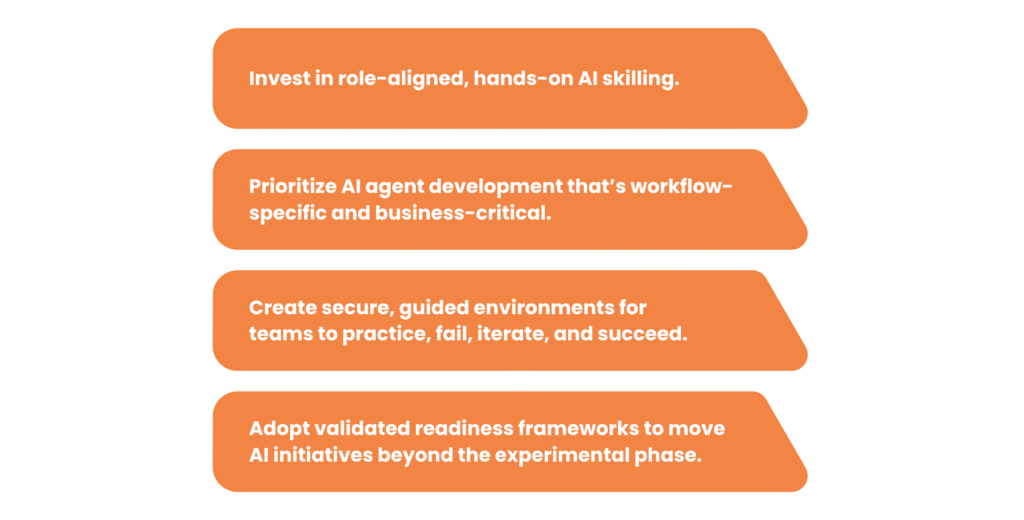
Platforms like Nuvepro are no longer nice-to-have – they’re mission-critical.
Enterprises must equip themselves with infrastructure that not only trains their teams but also prepares them for real business problems, ensuring AI projects are deployable, scalable, and value-generating from day one.
Agentic AI is ready to transform how work gets done. The question is – are your people?
If your enterprise is serious about achieving AI-driven outcomes, it’s time to move beyond presentations and proof-of-concept demos. It’s time to build AI-proficient workforces that don’t just talk about transformation but actively deliver it.
The AI skills gap is real, but it’s also solvable. And the organizations that solve it fastest will lead the next wave of enterprise innovation.

The future belongs to enterprises ready to operationalize AI, not as a side project, but as a core business enabler.
Now is the time.

